
STATIVE VERBS with keys added English ESL Worksheets for distance
Stative verbs are a special group of verbs that describe an abstract action like feelings, attitude, cognitive processes. These exercises will help you learn the main feature of stative verbs: we don't put them onto continuous tenses. If you would like to study how state verbs are used with particular tenses, please see the related topics below.
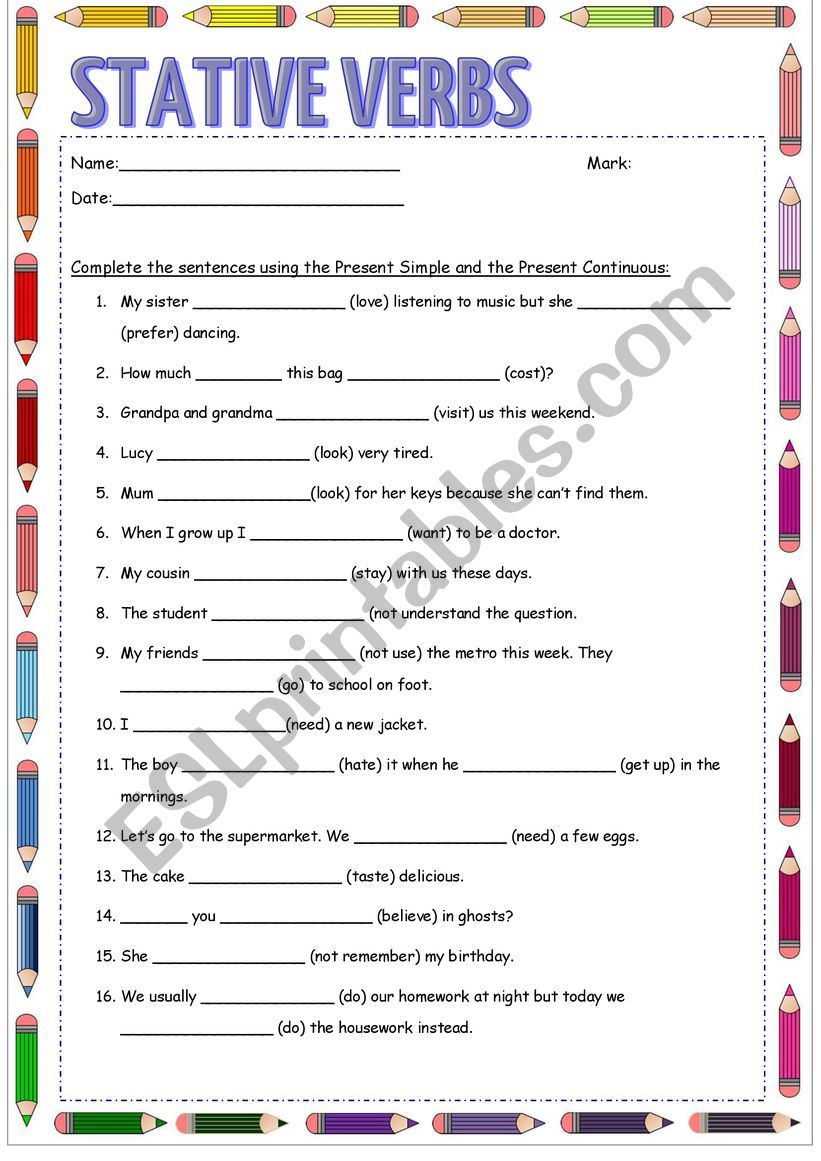
test stative verbs ESL worksheet by elenavanezi
What Are Stative Verbs? Stative verbs are verbs that do not express action but a state. These verbs usually relate to thoughts, emotions, senses, relationships, and measurements. The most common stative verbs are feel, see, hear, have, like, and want. For example: I want a new laptop. She feels happy today because she received flowers.
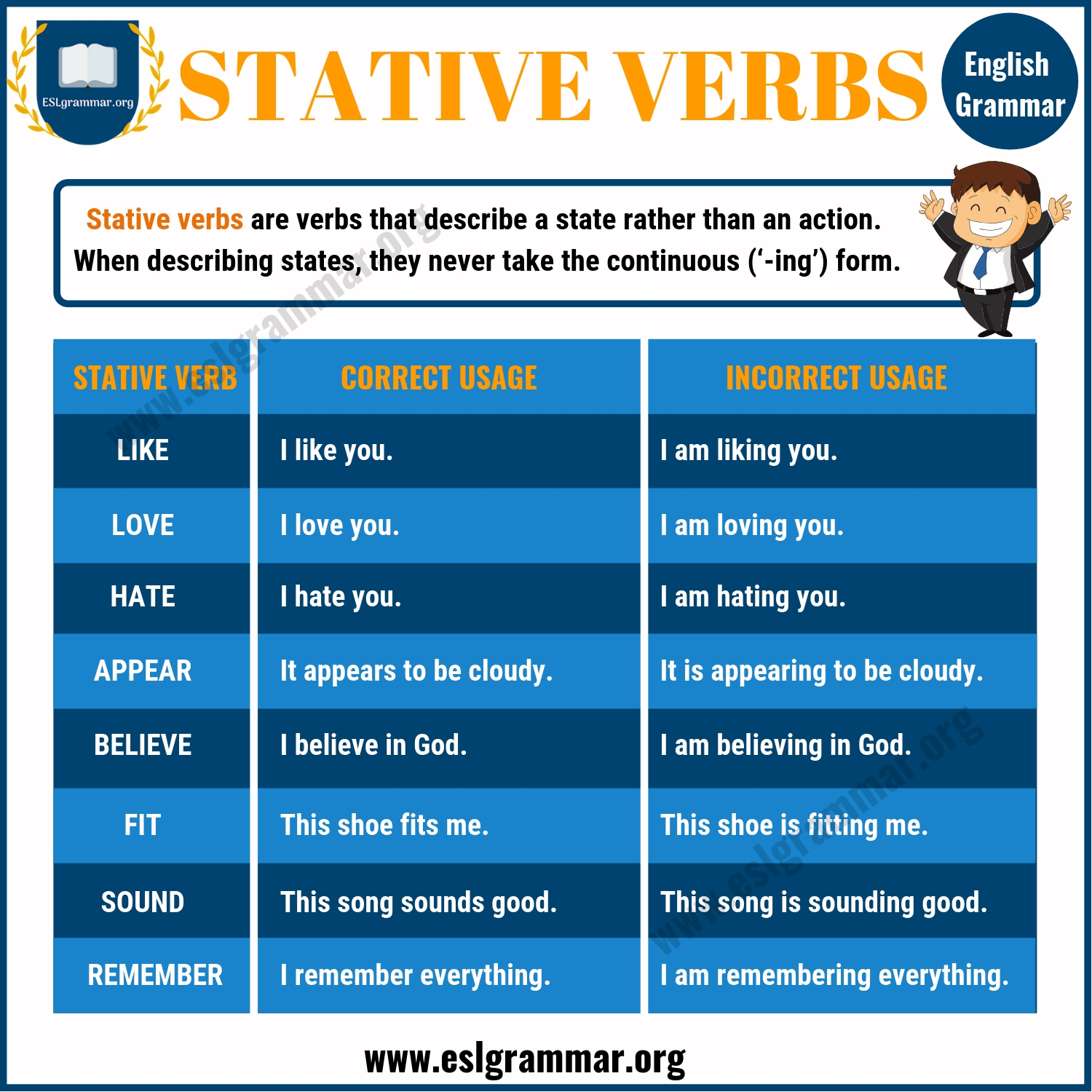
Stative Verbs Definition and Useful Examples in English ESL Grammar
to taste = try something → dynamic Example The apple mousse tastes a bit sour. The food blogger is tasting the risotto. Stative verbs (state verbs): explanation, examples - online exercise with answers #494. Use the "Reference" button to view the short summarised explanation.

A piece of Grammar Stative verbs. What are Stative Verbs? Teaching
LEVENT SCHOOLS INT. LEVENT LANGUAGE STUDIO SRLS. Via Amalfi 35, TREVISO piva 047 41960266 Tel. 347 42 58 840 [email protected]. WWW.LEVENTSCHOOL.COM. LESSON 6.1 STATIVE VERBS (EXTRA EXERCISES WITH ANSWERS. Choose the present simple or present continuous (these verbs are sometimes stative): 1.

Stative Verbs or Dynamic Verbs ESL Grammar Worksheet English Grammar
Rules and exercises . 9995 uses. pauks. Stative verbs. An exercise in which. 4127 uses. sariyse. Stative verbs. I put this document . 3090 uses. paddydog. Stative Verbs. This is a simple des. 1283 uses. Ayelyn. Stative Verbs. This lesson is a gra. 329 uses.. STATIVE VERBS with k. A revision of the st.
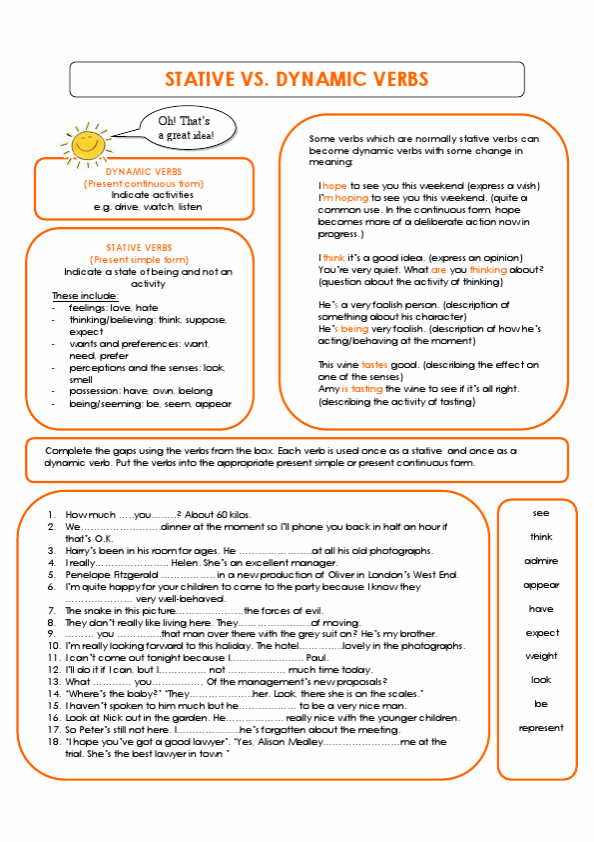
stative verbs worksheet stative verbs worksheets and online exercises
"Cost" can be either a noun or a verb.. As a noun, "cost" can refer to the money needed to buy or do something (e.g., "the cost of housing is too high") or the loss something requires or results in (e.g., "the war was won, but at the cost of many lives").. As a verb, "cost" is usually a transitive and stative verb used to describe the price of something or the loss.

stative verbs worksheet stative verbs interactive worksheet Adeline
Exercise 3 Fill in the gaps with the verb in brackets in the present simple or continuous form. Use the simple form with stative verbs and the continuous form with dynamic verbs. EXAMPLE: Joe believes (believe) in ghosts. 1 John (think) about his future. 2 Ali (have) three sisters. 3 It (smell) like something is burning.

English Grammar Stative Verbs
Dynamic Verbs and Stative Verbs Exercise 01 Put the verbs in brackets in their correct form. Some verbs are stative verbs and some are dynamic verbs. Use the simple present or present progressive tense. Press "Check" to check your answers. Use the "Hint" button to get a free letter if you don't know.
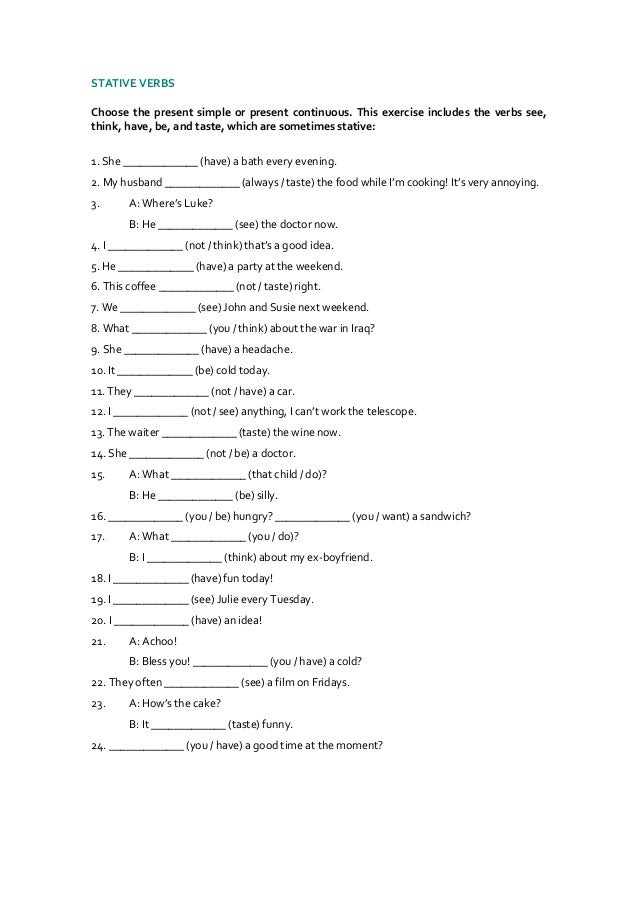
A. stative verbs
Start writing with Ginger Incorrect: I'm smelling your wife's wonderful spaghetti sauce. Correct: I smell your wife's wonderful spaghetti sauce. However, there are some verbs that look like they should be stative, but may appear in the ing form. These verbs differ in meaning to the stative verbs. Stative Verb Examples: see
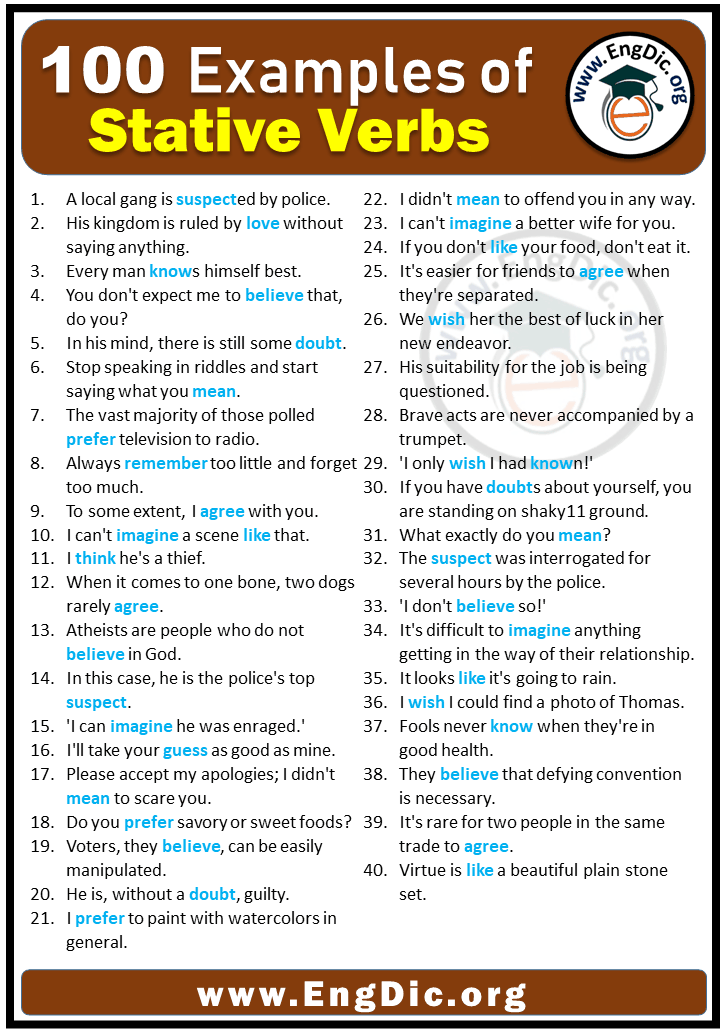
100 Examples of Stative Verbs in Sentences EngDic
Stative Verbs 1 Choose the present simple or present continuous. This exercise includes the verbs see, think, have, be, and taste, which are sometimes stative. Go back to the main stative verbs page Download a list of stative verbs in PDF here Do you want to master English grammar? Click here to read about the membership.
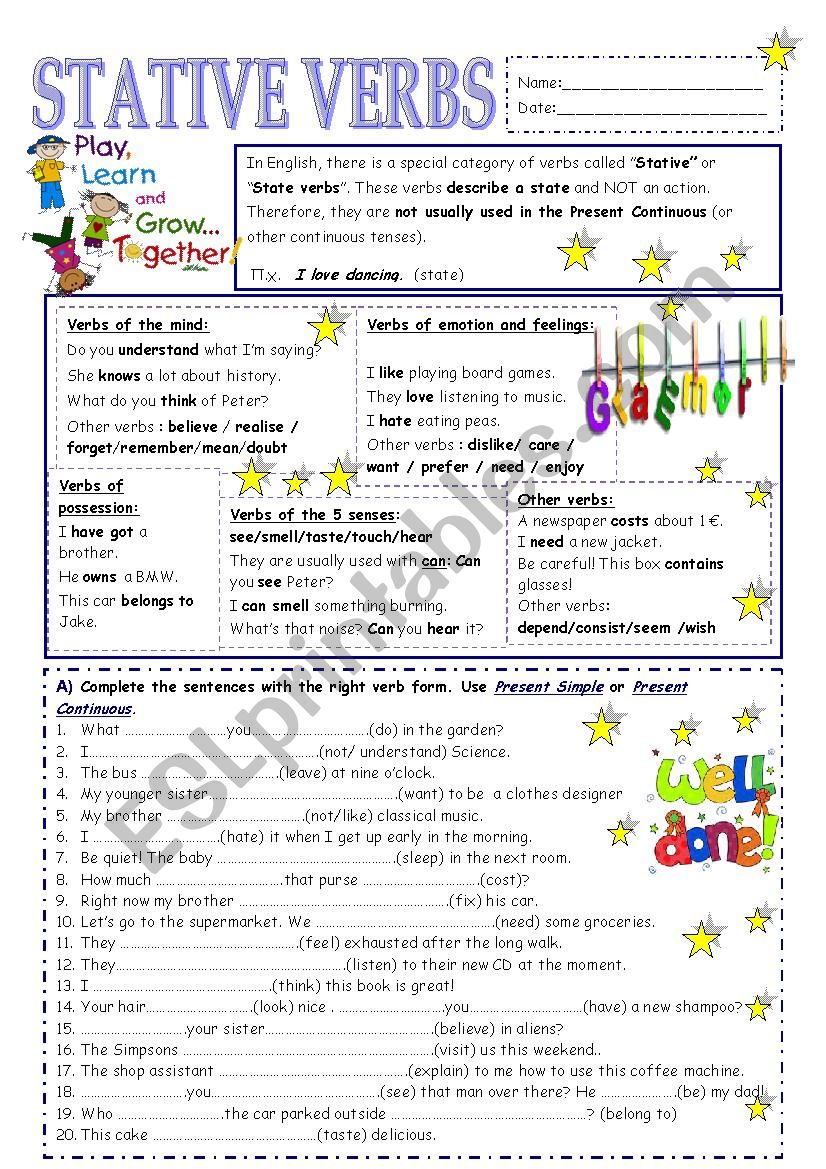
stative verbs worksheet stative verbs worksheets and online exercises
Grammar explanation Stative verbs describe a state rather than an action. They aren't usually used in the present continuous form. I don't know the answer. I'm not knowing the answer. She really likes you. She's really liking you. He seems happy at the moment. He's seeming happy at the moment. Stative verbs often relate to:

Stative Verbs Exercise 1 Nouns Worksheet, English Grammar Worksheets
Stative Verbs ruralcat Member for 4 years 1 month Age: 9+ Level: A2 Language: English (en) ID: 57157 03/01/2020 Country code: TR Country: Turkey School subject: English as a Second Language (ESL) (1061958) Main content: Stative verbs (2010582) Usage of non progressive verbs Other contents: Verb tenses, present continuous Loading ad.
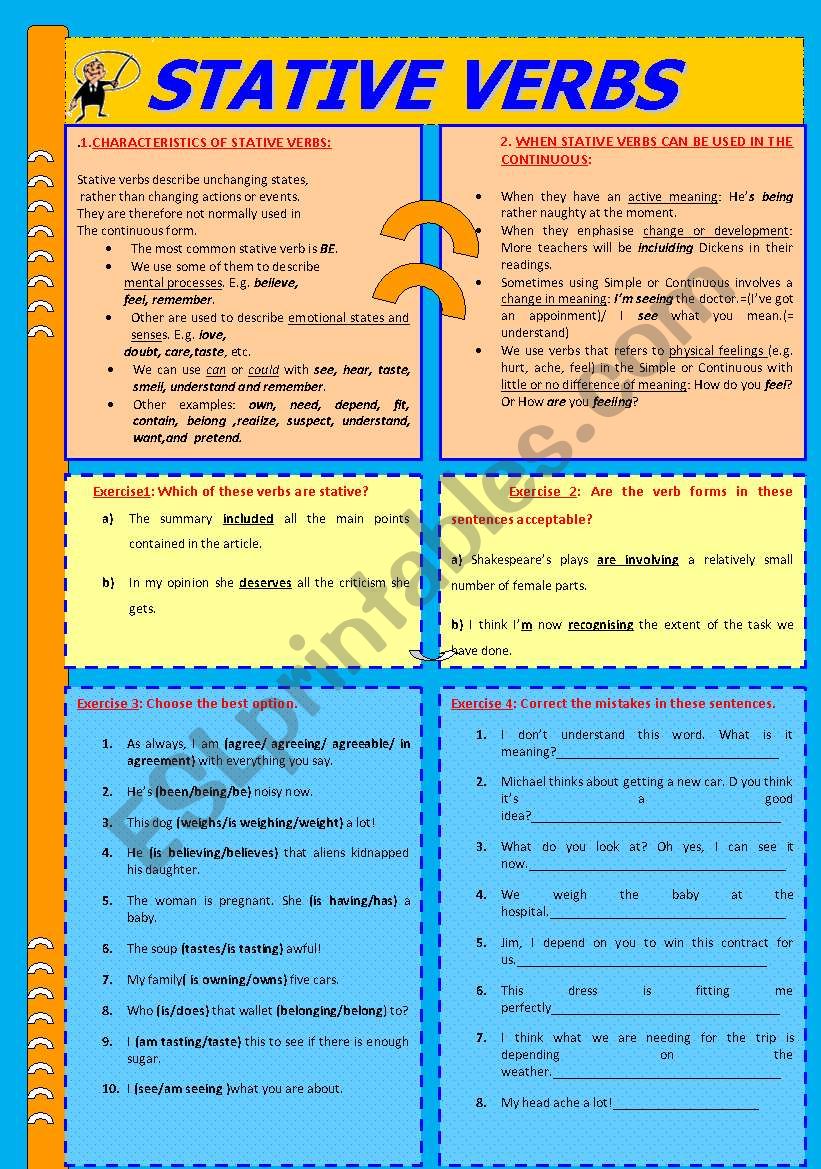
stative verbs interactive worksheet present simple or continuous
A stative verb, also state verb, is not used in the progressive tenses. They refer to the senses, feelings and emotions, long-term states, and characteristics. Learn more about stative verbs with Lingolia's quick and easy examples, then put your knowledge to the test in the exercises.

STATIVE VERBS with keys added worksheet Free ESL printable worksheets
smell. sound. Let's look at some examples of how these verbs are used differently. Example sentences: "I think it is wrong to hit children." Here, think is a stative verb. It means "to have an opinion" and it cannot be used in the progressive form in this case. BUT. "I 'm thinking about buying a new car."
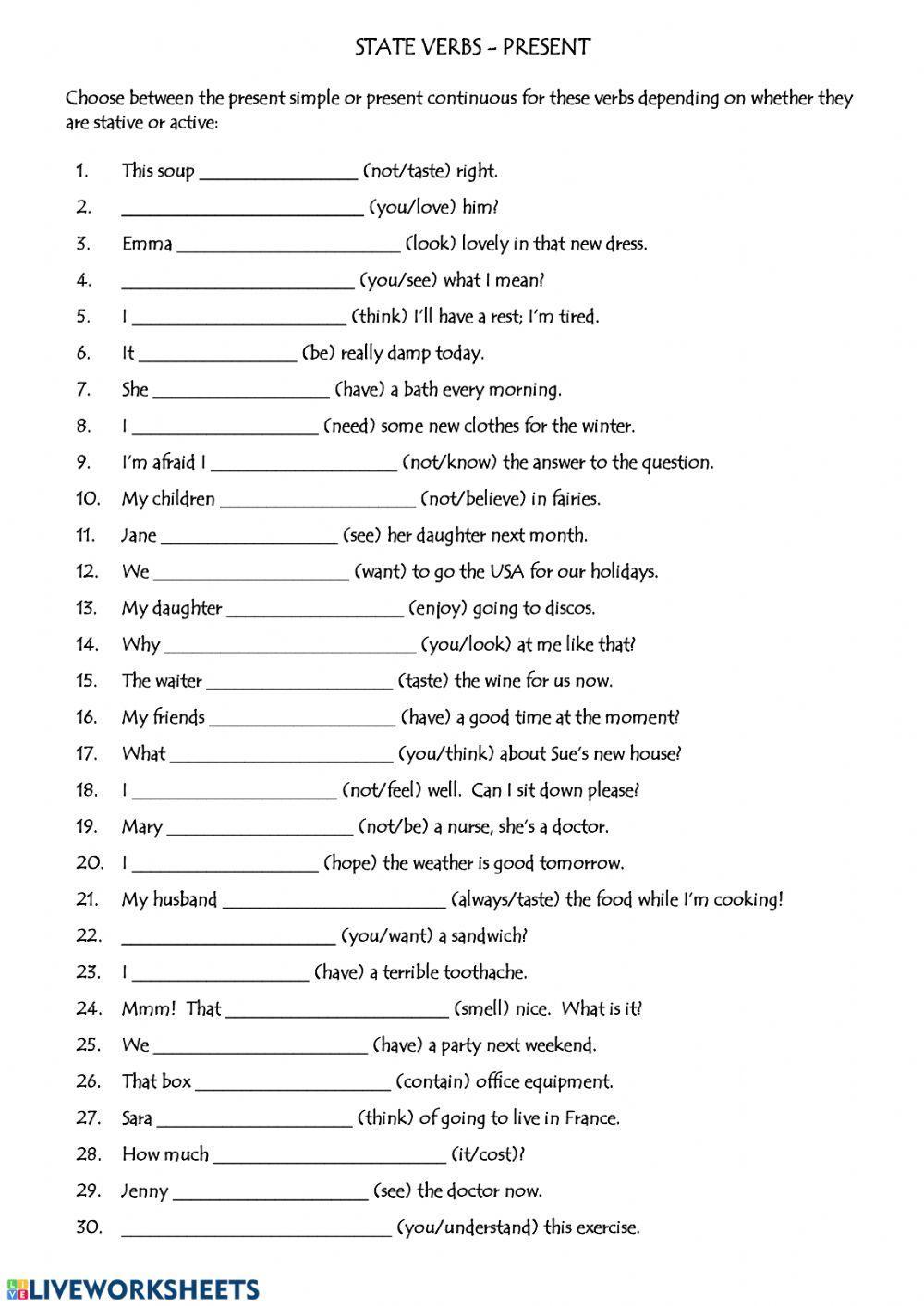
Present Simple Present Continuous Statives worksheet Live Worksheets
Stative Verbs - Free Exercise Get more practice with Lingolia Plus! hundreds of additional exercises organised by topic and level no subscription Stative Verbs - Free Exercise If the sentence is wrong, write the correct version in full in the gap below. If the sentence is right, simply write 'correct' in the gap. There are six incorrect sentences.
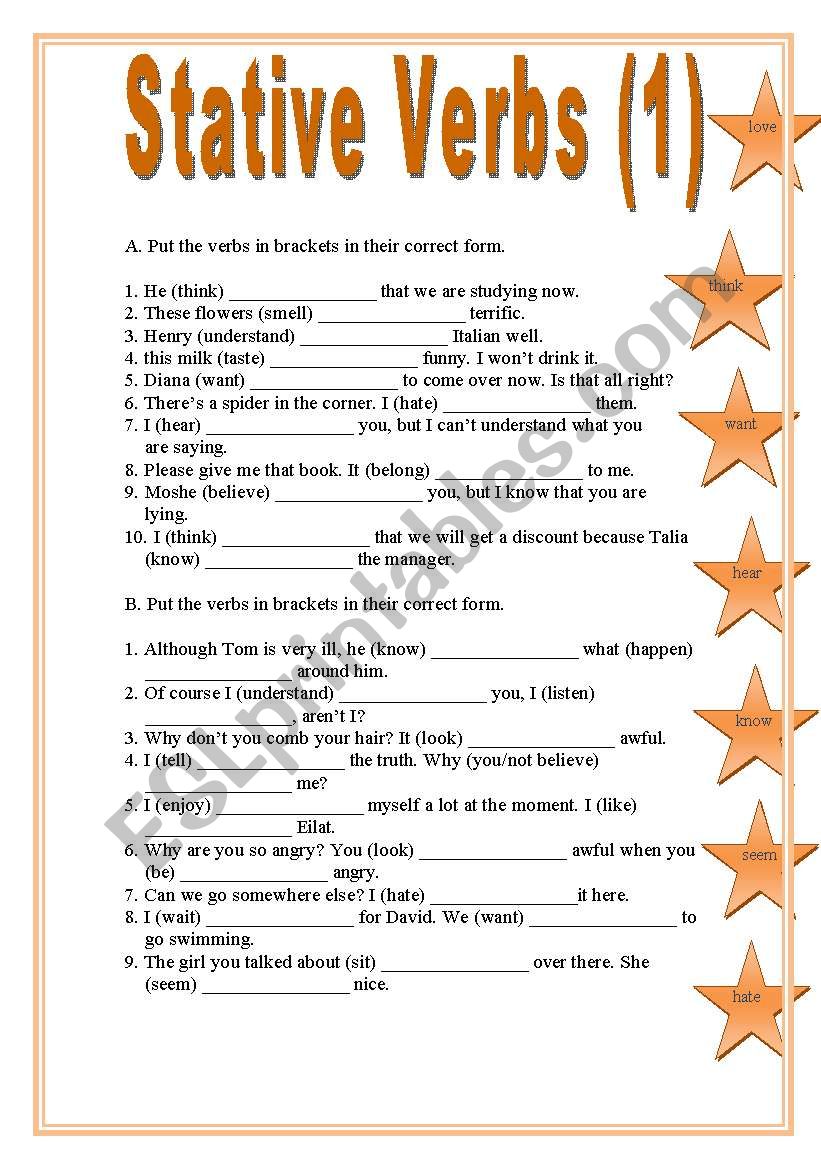
Stative Verbs (1) ESL worksheet by anatavner
A stative verb is a type of verb that describes a state of being or perception. Stative verbs can refer to mental (e.g., "believe") or emotional states (e.g., "dislike"), as well as physical states or qualities (e.g., "contain"). Stative verbs can be used to express possession, opinions, emotions, senses, and other states like.